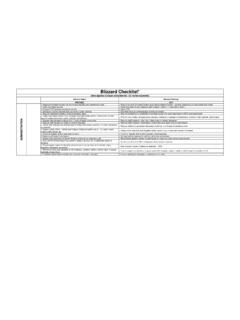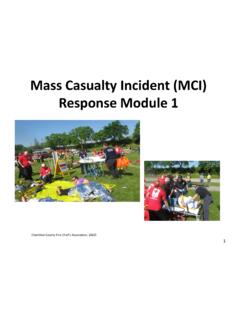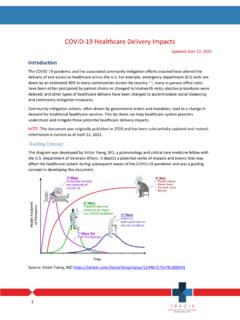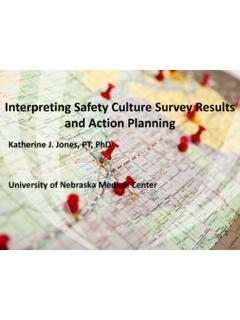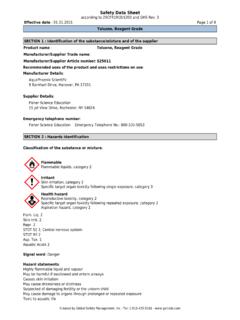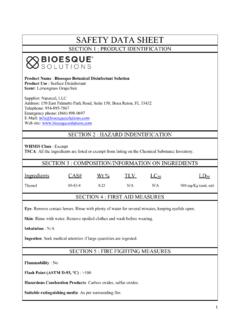Transcription of Understanding the Hospital Incident Command System
1 Understanding the Hospital Incident Command System (ICS) Module 22 ObjectivesPurpose:In this module, we will: Discuss the four phases of emergency management Define the Incident Command System (ICS) and Hospital Incident Command System (HICS) Understand the ICS and HICS structures and functions Understand the importance of chain of Command and unity of Command Explore the contents of the emergency operations plan Four Phases of Emergency Management4 The Four Phases of Emergency Management Current thinking defines four phases of emergency management: mitigation, preparedness, response, and recovery (FEMA, 2018).ResponseMitigationPreparednessReco very5 The Four Phases of Emergency ManagementMitigationPreventing future emergencies or minimizing their effects Includes any activities that prevent an emergency, reduce the chance an emergency will happen.
2 Or reduce the damaging effects of unavoidable emergencies Mitigation activities take place before and after emergencies6 The Four Phases of Emergency ManagementPreparednessPreparing to manage an emergency Includes plans or preparations made to save lives and to help response and rescue operations Preparedness activities occur prior to an emergency Evacuation plans and stockpiling food are both examples of preparedness7 The Four Phases of Emergency ManagementResponseResponding safely to an emergency Includes actions taken to save lives and prevent further property damage in an emergency situation. Response is putting your preparedness plans into action Response activities occur during an emergency Seeking shelter from a tornado is an example of response (FEMA, 2018)8 The Four Phases of Emergency ManagementRecoveryRecovering from an emergency Includes actions taken to return to a normal or an even safer situation following an emergency Recovery occurs after an emergency Recovery includes repairing any damage or entering any downtime documentation and can take weeks, months and sometimes years.
3 (FEMA, 2018)9 Emergency Operations Plan The purpose of the Emergency Operations Plan (EOP) is to provide an all hazards approach to emergency management to eliminate or minimize the disruptions that affect a facility s ability to provide care and support to clients. (CDC, 2012)(Ohio Association of Community Health Centers, 2012)10 Examples of Emergency Operations Plan Contents Plan Implementation Notification of Emergency Emergency Phone System Media Center Resource Procurement Child Care Emergency Bed Utilization Surge Capacity/ Diversion Acute Care Site establishment Crisis Staffing Shelter Availability Critical Incident Stress Debriefing Care of Deceased(Spectrum Health, 2018)11 Question 1:The Hospital decontamination team performs monthly donning and doffing drills.
4 During the drill, the team will respond by taking all preventative actions before putting on personal protective equipment (PPE), then proceed to dress in the protective equipment. They are timed and critiqued based on effectiveness. These drills benefit the Hospital decontamination team so they are able to reduce mistakes and readily respond in the case of an is an example of which phase of Emergency Management?A. ResponseB. PreparednessC. MitigationD. Recovery12 Question 1:The Hospital decontamination team performs monthly donning and doffing drills. During the drill, the team will respond by taking all preventative actions before putting on personal protective equipment (PPE), then proceed to dress in the protective equipment.
5 They are timed and critiqued based on effectiveness. These drills benefit the Hospital decontamination team so they are able to reduce mistakes and readily respond in the case of an is an example of which phase of Emergency Management?A. ResponseB. PreparednessC. MitigationD. RecoveryThe correct answer is Command System (ICS) Basics14 What is ICS?The Incident Command System (ICS) is a standardized approach to the Command , control, and coordination of emergency response Incident management. (Federal Emergency Management Agency [FEMA], 2018)When is ICS Used? ICS has evolved to an Incident management System for all hazards and can be used in small or large-scale incidents.
6 Essentially anything that may impact daily operations. Some examples include: Hazardous Materials (HAZMAT) incidents Planned events ( , concerts, official visits, sporting events, festivals) Fires Mass casualty incidents Active shooter/ bomb threat Lack of resources High census Technological incidents Natural disasters Wide-area search and rescue missions(SEAPRO, 2019)15 Plain Language and Common Terminology ICS requirescommon terminology so all agencies have the ability to collaborate. The goal when using plan language and common terminology is to ensure efficient, clear communication among all parties involved in managing an Incident .
7 For effective communication: Use common terms or clear text that any person can comprehend Do not use radio codes, agency-specific codes, acronyms, or jargon(FEMA, 2018)1617 Chain of Command vs. Unity of Command Chain of Command Refers to the orderly line of authority within the ranks of the Incident management structure. Unity of Command Means that every individual has a designated supervisor to whom he or she reports when managing the Incident . These principles clarify reporting relationships and eliminate the confusion caused by multiple, conflicting directives. (FEMA, 2018)18 Question 2:What is the Incident Command System ?
8 Select the correct multiple choice organization s management approach to Incident solution to manage both planned events and unplanned and and C19 Question 2:What is the Incident Command System ?Select the correct multiple choice organization s management approach to Incident solution to manage both planned events and unplanned and and CThe correct answer is 3:True or False?Each nurse has a single designated supervisor they report to in an Incident . This is an example of Unity of 3:True or False?Each nurse has a single designated supervisor they report to in an Incident . This is an example of Unity of correct answer is Incident Command SystemHospital Incident Command System (HICS) The HICS structure is an ICS structure specifically designed for hospitals.
9 The principles presented in the HICS framework overlap the mission areas: Prevention, Protection, Mitigation, Response, and Recovery. HICS can be used in both emergent incidents or non-emergent events. Functions are performed by the Hospital Incident Management Team (HIMT).( Hospital Incident Command System [HICS], 2014), (Weden, 2016)2324 Hospital Incident Command System (HICS) Benefits of using HICS: Flexible and adaptable to meet specific needs and capabilities of hospitals Can staff anywhere from 1 70 positions as needed Customizable Component of an Emergency Operations Plan Efficient response Integration with community Federal preparedness and response grant compliant Accreditation compliance Resource management25 Question 4:What are the benefits of managing incidents with the Hospital Incident Command System ?
10 Select the correct multiple choice and integration with community with federal preparedness and response grant of the of the above26 Question 4:What are the benefits of managing incidents with the Hospital Incident Command System ?Select the correct multiple choice and integration with community with federal preparedness and response grant of the of the aboveThe correct answer is 5:True or False?Your organization s Incident Command structure should be implemented with any situation that may cause operational 5:True or False?Your organization s Incident Command structure should be implemented with any situation that may cause operational correct answer is Incident Management Team30 Hospital Incident Management Team (HIMT) The HIMT structure depicts HICS functions with identifiedroles for how responsibilities are distributed among theassigned team members.
